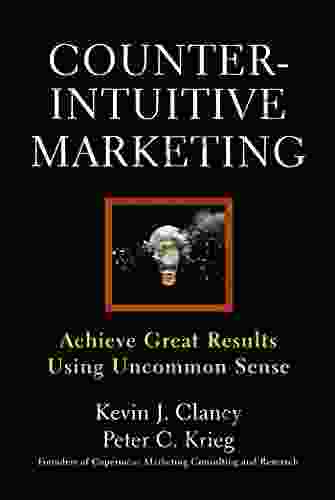What If Everything You Remember Never Happened?

Our memories are the foundation of our identity. They shape our beliefs, our values, and our relationships. But what if everything you remember never happened? What if your entire life was a fabrication, a lie that you had been living for years?
That's the premise of "What If Everything You Remember Never Happened," a thought-provoking short story by C. Robert Cargill. The story follows a man named Michael, who wakes up one morning with no memory of the past 10 years. He doesn't remember his wife, his job, or even his own name.
5 out of 5
| Language | : | English |
| File size | : | 578 KB |
| Text-to-Speech | : | Enabled |
| Screen Reader | : | Supported |
| Enhanced typesetting | : | Enabled |
| Word Wise | : | Enabled |
| Print length | : | 13 pages |
| Lending | : | Enabled |
Michael is understandably confused and disoriented. He tries to piece together his life from the fragments of information that he can find, but it's like trying to solve a puzzle with missing pieces. The more he learns, the more he realizes that his life is not what it seems.
"What If Everything You Remember Never Happened" is a fascinating exploration of identity, memory, and the nature of reality. It's a story that will stay with you long after you finish reading it.
The Science of Memory
Memory is a complex process that is not fully understood. However, scientists have learned a great deal about how memories are formed and stored in the brain.
Memories are created when the brain encodes new information. Encoding is the process of converting information into a form that the brain can store. There are three main types of encoding: acoustic encoding, visual encoding, and semantic encoding.
Acoustic encoding is the process of storing information in the form of sound. When you hear something, the sound waves travel to your ears and are converted into electrical signals. These signals are then sent to the brain, where they are stored in the auditory cortex.
Visual encoding is the process of storing information in the form of images. When you see something, the light waves travel to your eyes and are converted into electrical signals. These signals are then sent to the brain, where they are stored in the visual cortex.
Semantic encoding is the process of storing information in the form of meaning. When you learn something new, the brain creates a mental representation of the information. This representation is stored in the hippocampus, which is a region of the brain that is involved in memory formation.
Once information has been encoded, it is stored in the brain in a variety of ways. Some memories are stored in the short-term memory, which can hold information for up to about 20 seconds. Other memories are stored in the long-term memory, which can hold information for a lifetime.
The long-term memory is divided into two types: explicit memory and implicit memory.
Explicit memory is the memory of facts and events that you can consciously recall. For example, you might remember your birthday, your phone number, or the name of your first pet.
Implicit memory is the memory of skills and procedures that you can perform without consciously thinking about them. For example, you might remember how to ride a bike, play the piano, or tie your shoes.
Memories are not static. They can change over time as new information is learned and old information is forgotten. This process is known as memory consolidation.
Memory consolidation is a complex process that is not fully understood. However, it is thought to involve the hippocampus and other brain regions. Over time, memories become more stable and less likely to change.
The Unreliability of Memory
While memories are essential for our identity, they are not always reliable. Memories can be distorted, forgotten, or even implanted.
There are a number of factors that can affect the reliability of memory. These factors include:
- The age of the memory
- The emotional state of the person when the memory was formed
- The amount of time that has passed since the memory was formed
- The number of times the memory has been recalled
The age of the memory is a significant factor in its reliability. Memories that are formed early in life are more likely to be accurate than memories that are formed later in life.
The emotional state of the person when the memory was formed can also affect its reliability. Memories that are formed when a person is emotionally aroused are more likely to be distorted than memories that are formed when a person is calm.
The amount of time that has passed since the memory was formed can also affect its reliability. Memories that are recalled soon after they are formed are more likely to be accurate than memories that are recalled many years later.
The number of times the memory has been recalled can also affect its reliability. Memories that are recalled frequently are more likely to be distorted than memories that are recalled less frequently.
In addition to these factors, there are a number of other factors that can affect the reliability of memory. These factors include the use of alcohol or drugs, the presence of mental illness, and the influence of others.
The Implications of Unreliable Memory
The unreliability of memory has a number of implications for our lives. For example, it can make it difficult to trust our own memories.
If we cannot trust our own memories, how can we be sure of anything? How can we know what is real and what is not?
The unreliability of memory also has implications for the legal system. In many cases, eyewitness testimony is used to convict criminals. However, if memories are unreliable, how can we be sure that eyewitness testimony is accurate?
The unreliability of memory is a serious problem that has a number of implications for our lives. It is important to be aware of the factors that can affect the reliability of memory and to take steps to minimize the effects of these factors.
"What If Everything You Remember Never Happened" is a thought-provoking story that explores the nature of identity, memory, and reality. It is a story that will stay with you long after you finish reading it.
The unreliability of memory is a serious problem that has a number of implications for our lives. It is important to be aware of the factors that can affect the reliability of memory and to take steps to minimize the effects of these factors.
We should never take our memories for granted. They are precious and fragile, and they can be lost in an instant.
5 out of 5
| Language | : | English |
| File size | : | 578 KB |
| Text-to-Speech | : | Enabled |
| Screen Reader | : | Supported |
| Enhanced typesetting | : | Enabled |
| Word Wise | : | Enabled |
| Print length | : | 13 pages |
| Lending | : | Enabled |
Do you want to contribute by writing guest posts on this blog?
Please contact us and send us a resume of previous articles that you have written.
 Top Book
Top Book Novel
Novel Fiction
Fiction Nonfiction
Nonfiction Literature
Literature Paperback
Paperback Hardcover
Hardcover E-book
E-book Audiobook
Audiobook Bestseller
Bestseller Classic
Classic Mystery
Mystery Thriller
Thriller Romance
Romance Fantasy
Fantasy Science Fiction
Science Fiction Biography
Biography Memoir
Memoir Autobiography
Autobiography Poetry
Poetry Drama
Drama Historical Fiction
Historical Fiction Self-help
Self-help Young Adult
Young Adult Childrens Books
Childrens Books Graphic Novel
Graphic Novel Anthology
Anthology Series
Series Encyclopedia
Encyclopedia Reference
Reference Guidebook
Guidebook Textbook
Textbook Workbook
Workbook Journal
Journal Diary
Diary Manuscript
Manuscript Folio
Folio Pulp Fiction
Pulp Fiction Short Stories
Short Stories Fairy Tales
Fairy Tales Fables
Fables Mythology
Mythology Philosophy
Philosophy Religion
Religion Spirituality
Spirituality Essays
Essays Critique
Critique Commentary
Commentary Glossary
Glossary Bibliography
Bibliography Index
Index Table of Contents
Table of Contents Preface
Preface Introduction
Introduction Foreword
Foreword Afterword
Afterword Appendices
Appendices Annotations
Annotations Footnotes
Footnotes Epilogue
Epilogue Prologue
Prologue Amy Carlile
Amy Carlile Lila Kossyvaki
Lila Kossyvaki Michael Farrell
Michael Farrell Levi Peretz
Levi Peretz Jay Heins
Jay Heins Corey Walden
Corey Walden H P Lori
H P Lori Marion Abrams
Marion Abrams Amy Zoellers
Amy Zoellers David Clinton
David Clinton Cris Yeager
Cris Yeager Maurice R Greenberg
Maurice R Greenberg Michael Pool
Michael Pool Kathryn Hughes
Kathryn Hughes Akhtar Mayo
Akhtar Mayo Marguerite Kaye
Marguerite Kaye Edward Jones
Edward Jones Alexander Manu
Alexander Manu Amrit Pal Tiwana
Amrit Pal Tiwana Rawlin Cash
Rawlin Cash
Light bulbAdvertise smarter! Our strategic ad space ensures maximum exposure. Reserve your spot today!
 Roberto BolañoFollow ·18.3k
Roberto BolañoFollow ·18.3k Harry CookFollow ·14.1k
Harry CookFollow ·14.1k Glenn HayesFollow ·7k
Glenn HayesFollow ·7k Edison MitchellFollow ·4.7k
Edison MitchellFollow ·4.7k Miguel de CervantesFollow ·11.3k
Miguel de CervantesFollow ·11.3k Angelo WardFollow ·12.3k
Angelo WardFollow ·12.3k Frank ButlerFollow ·10.4k
Frank ButlerFollow ·10.4k Allan JamesFollow ·11.1k
Allan JamesFollow ·11.1k

 Christopher Woods
Christopher WoodsDeath's Second Chance: The Unbelievable Story of Cris...
On July 29, 2008, Cris...

 Esteban Cox
Esteban CoxFrom Ralphie Kids to Adolescents: The Journey to Manhood
The transition from...

 Chris Coleman
Chris ColemanLetters From Young Father Poems: Delving into the Heart...
Fatherhood, a journey filled...

 Holden Bell
Holden BellCounterintuitive Marketing: Achieving Great Results Using...
In the ever-evolving world of...
5 out of 5
| Language | : | English |
| File size | : | 578 KB |
| Text-to-Speech | : | Enabled |
| Screen Reader | : | Supported |
| Enhanced typesetting | : | Enabled |
| Word Wise | : | Enabled |
| Print length | : | 13 pages |
| Lending | : | Enabled |
















